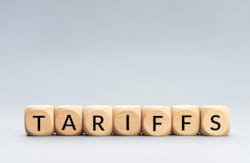President Donald Trump ratcheted up the U.S. trade war on Friday, threatening to impose a new 25% levy against Apple and a 50% tariff on the European Union.
Lamenting that negotiations with the EU "are going nowhere," Trump said on Truth Social that he is recommending "a straight 50% Tariff on the European Union, starting on June 1, 2025."
If the new duties come into effect, they would dramatically hike the current U.S. baseline levy of 10% and raise economic tensions between the world's biggest economy and its largest trading bloc.
In a separate message, the president said Apple had failed to move iPhone production to the United States despite his repeated requests, and he threatened new duties of "at least" 25% if they did not comply.
Wall Street stocks fell in early trading, with Apple's share price dropping 2.7%.
The VIX volatility index, known as Wall Street's "fear gauge," was up 18.5% at around 9:30 a.m. local time in New York.
'Difficult' Negotiations
Last month, Trump imposed sweeping tariffs against most countries, introducing steep duties for several trading partners -- including the EU -- and sector-specific measures on automobiles, steel and aluminum not produced in the United States.
Markets tanked following the announcement, and a few days later, the U.S. president announced he would roll back the higher levies to 10% for a 90-day pause to allow for trade negotiations, while keeping the sector-specific measures in place.
Since then, Trump has announced a deal to permanently roll back some sector-specific tariffs on Britain and another agreement with China to reduce prohibitively high levies and retaliatory measures for 90 days.
The talks between the United States and the EU have failed to make much progress, with Brussels recently threatening to hit U.S. goods worth nearly 100 billion euros ($113 billion) with tariffs if it does not lower the duties on European goods.
In his early morning social media post on Friday, Trump said the EU had been "formed for the primary purpose of taking advantage of the United States on TRADE," and took a swipe at the "difficult" negotiations taking place.
An EU spokesperson declined to comment on the threats of new tariffs, telling AFP that a call was set to take place later Friday between EU Trade Commissioner Maros Sefcovic and U.S. Trade Representative (USTR) Jamieson Greer.
Spokespeople for the USTR, the Commerce Department, the White House and the Treasury Department did not immediately respond to a request for comment.
US-Made iPhones 'Not Feasible'
Trump's fresh criticism of Apple revived the pressure on Chief Executive Tim Cook to do more to bring manufacturing jobs back to the United States from Asia.
Most of Apple's iPhones assembly happens in China, although the company has in recent years been shifting production to other countries, including India.
The problem with Trump's proposal, according to Wedbush Securities analyst Dan Ives, is that reshoring iPhone production to the United States "is a fairy tale that is not feasible."
"This would result in an iPhone price point that is a non-starter for Cupertino and translate into iPhone prices of ~$3,500 if it was made in the U.S.," he wrote in a note to clients, referring to the location of Apple's California headquarters.
This is simply "not realistic," he said, adding that it would take up to 10 years to shift production to the United States.
In a recent report, Bank of America Securities analysts said that the labor costs alone of moving assembly to the United States would add around 25% to the price of the high-end iPhone 16 Pro Max.
"On top of that, if Apple had to pay reciprocal tariffs to import sub-assemblies into the U.S., we see the total cost of an iPhone increasing 90%+" they added.
All rights reserved ©2025 Agence France-Presse
About the Author
Agence France-Presse
Copyright Agence France-Presse, 2002-2025. AFP text, photos, graphics and logos shall not be reproduced, published, broadcast, rewritten for broadcast or publication or redistributed directly or indirectly in any medium. AFP shall not be held liable for any delays, inaccuracies, errors or omissions in any AFP content, or for any actions taken in consequence.
